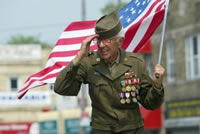 |
As the sound grows louder, it’s clear that whoever is playing the instrument is drawing closer. In the distance, I can see a man in a plaid kilt walking down the hall toward where I’m sitting. And as he draws nearer, the people to my left rise to their feet. I, too, must stand—if only to see why the bagpipe-playing, kilt-wearing gentleman is garnering so much attention.
I then see that the bagpiper is leading a procession. Behind him, sitting statue-straight in rolling chairs, are 14 World War II veterans. I know this because they’re wearing identical caps proclaiming their status. The veterans are lined up two men to a row, just as if they were marching down the hall in formation.
Compensation.BLR.com, now thoroughly revved with easier navigation and more complete compensation information, will tell you what’s being paid right in your state–or even metropolitan area–for hundreds of jobs. Try it at no cost and get a complimentary special report. Read More.
All the people I can see—other than the 14 veterans—are now on their feet. And they’re applauding these aged heroes as they move down the airport hallway. The veterans, who all must be nearing if not beyond 90 years of age, are politely waving to the crowd. The sight is so moving that many people in the crowd are recording it with their phones, and tears can been seen rolling down more than one person’s cheeks.
That’s when it happened. The veteran in the last row nearest to me looks over and spots a young boy maybe 7 or 8 years of age and crisply salutes the young onlooker. The boy raises his hand to his forehead and salutes the old soldier back. Two people, separated by three generations, share a moment, and all of us within sight get to experience it. And then the procession moves on, but the impression from the scene I had witnessed does not.
What this story has to do with management or leadership I’m not sure. But it was so profound of an experience that I had to share it. So let me offer a few thoughts that ran through my head as I reflected on what I had seen. Can you imagine being a part of something that—70 years later—the mere fact that you participated in it causes people to rise to their feet and applaud you? That you were a part of something so significant and memorable that people who weren’t born until 20, 40, even 60 years later want to honor you for your involvement?
I’m Not a Soldier
I’m not a soldier, never have been and never will be. I’m not a police officer, firefighter, or any other type of professional who puts himself or herself in harm’s way to help others. Like most of you, I go to work day in and day out safely tucked away within the four walls of my office. But that doesn’t mean we shouldn’t aspire to leave our mark on this world. It doesn’t mean we can’t make this world a better place for others. Maybe not in the same way those veterans did when they took up their arms to defend our country, but we can still have an impact on the lives around us.
Try BLR’s all-in-one compensation website, Compensation.BLR.com®, and get a complimentary special report, Top 100 FLSA Overtime Q&As, no matter what you decide. Find out more.
I was asked the other day whether the people who work for me can achieve their goals and dreams at our company. Sure, we talk about goals—but can I really help people achieve their dreams? What I’ve discovered is that yes, I can.
You see, some people dream of having a good-paying job that allows them to provide a good home for their families. Others dream of having meaningful work they truly enjoy or a work schedule that allows them to attend to an aging parent. And there are those who want to provide customers with products and services they truly need and appreciate.
Everyone has his or her own dreams. It’s your job as a manager to understand what they are and how you can help them achieve those dreams. Because if you can help people achieve their dreams, you’ll have a wonderfully motivated, loyal, and hardworking workforce. Now that’s a dream of most managers!
